- Home
- Bertram Mitford
Forging the Blades: A Tale of the Zulu Rebellion Page 14
Forging the Blades: A Tale of the Zulu Rebellion Read online
Page 14
CHAPTER FOURTEEN.
FORGING THE BLADES.
Malemba, the assegai-maker, sat plying his trade busily. Around him,interestedly watching the process, squatted several young Zulus.
Malemba was an old man, and grizzled. He wore the ring, as well hemight, for his trade was a profitable one, and he had wives and cattlegalore. He had made assegais for the fighting men of Dingana and Mpandeand Cetywayo, and as a skilled craftsman his repute was great. In thosedays his remuneration had been rendered in cattle or other kind, now itwas in hard English money, and nothing else would satisfy him.
Such blades he turned out, such splendid blades, keen as razors, thefluting in perfect symmetry--broad blades for close quarter, stabbingpurposes; long, tapering ones, which would bring down a buck at fortyyards if well thrown, or an enemy at the same distance. Why, Dinganahad commanded them more than once, indeed when a more powerful but lessskilful rival had sought his destruction that king had ordered the deathof that rival instead. Cetywayo had even more keenly appreciated hisskilful craftsmanship, so that Malemba might safely have put up a noticeover his primitive forge: "Assegai-forger to the Royal Family."
His son, Umjozo, did the stick-making; and the binding of the blades,and the plaiting of the raw hide which should secure these within theirhafts to last for all time, was a work of art in itself. By and byBirmingham-forged blades were imported, surreptitiously, by the traders;but the assegai turned out by old Malemba and his son never fell inreputation. It was to the imported article as the production of a crackfirm of gun-makers would be to the cheap gun purchasable at six or sevenpounds in an ironmonger's shop. And yet it was forged mostly out of oldscrap iron--cask-hoops, nuts, bolts, anything thrown away by theroadside, but carefully collected.
For years Malemba's trade had been in abeyance, if not practicallyextinct. There had been occasional rumours which threatened to call itforth again, but nothing had come of them. Well, it didn't matter. Hewas a rich man, in short, a successful manufacturer who had made hispile and could afford to retire. And yet--and yet--the hard Englishmoney flowed into the country, and it represented everything that shouldrender a man's declining years comfortable and pleasant; and further,Malemba loved his craft, and took an artist's pride in it; whereforeeven his prosperity left something further to wish for.
Then sporadic rumours began to creep about, and the atmosphere becamecharged. In the midst of which Malemba was sent for by a powerfulchief, and offered such tempting inducements that he decided to open hisforge again. And that chief was Sapazani.
For Sapazani had wielded weapons of Malemba's manufacture with his ownhand, had wielded them to considerable purpose, too. He desired nothingso much as to wield them again.
Sapazani, the ultra-conservative, had no use for assegais fabricatedacross the seas. He knew the balance and the temper of the home-madearticle to a nicety, especially that made by Mklemba. Wherefore he senthis invitation to the latter, and lo! under the noses of the civilofficials and the half-dozen police who represented or carried out lawand order in the district, Malemba's forge was set up, and turned outits score of assegais _per diem_. But the Lumisana district was a verywide, wild and, in parts, inaccessible tract, and in one of its mostremote and inaccessible ranges was Malemba's forge set up.
"Ah, my sons," said the old man, as he paused in his work to take snuff,while his assistants were arranging their primitive bellows. "Ah, mysons, I fear me that what I do is useless. What are these poor weaponsbeside the thunder and lightning wherewith the Amangisi and the Amabunapoured death upon each other from distances further than a man can see?How then will ye get near enough to use these?"
"But, my father," answered one of the spectators, "what if the _izanusi_put _muti_ upon us which render the white man's bullets of no avail?"
The old man chuckled, and his face crinkled up.
"Will the _izanusi_ doctor themselves and then stand up and letthemselves be shot at?" he answered. "Will they do this? _Ou_!"
This was a puzzler. His hearers were pretty sure they would do no suchthing, yet so ingrained is this stale and flimsy superstition, thatnotwithstanding the numbers of times its utter fallacy had been proved,there is no getting it out of the native system.
"I made blades for that Elephant who fell by `the stroke of Sopuza,'when your fathers were children," went on the old man, "Dingana, whoscourged the Amabuna as a whip-lash scourges an ox, until he had to takeflight when our nation was divided. But then the guns of the Amabunashot but feebly and there was opportunity to run in and make an end.But now, when the white man's bullets fall thick as the stones in thefiercest hail storm, what chance have ye with these?" pointing to a rowof blades which awaited the binding. Whereby it will be seen thatMalemba was progressive.
Even this argument did not impress the group. They were inclined tomake very light of it.
"We will not allow them time to fire their bullets at all, my father,"laughed another of them. "We shall eat them up while they sleep."
"But will they sleep?" said the old man, his head on one side.
"Will they not? They are asleep even now," came the answer. "We neednot even wait until night. They are scattered. We can take them at anytime--when `the word' is given."
"When `the word' is given! Ah! ah! When the word is given." And theold man chuckled darkly.
"What means our father?"
"What I mean? What if `the word' is given too late? Or worse still--too soon? _Ou_!"
"That will not be, my father. The chain is now forged, even as theseblades. And the whites are scattered--scattered. They lie in ourhands."
"Let them not lie there too long, or perchance they may spring out,"returned Malemba quizzically. "Well, I have nought to do with it, I whoam old. I can but make you the weapons, it is for yourselves to wieldthem. And most of you have never learned the art. You were born toolate."
A laugh went up at this. The old assegai-maker was looked upon with thegreatest veneration. His wisdom was recognised and appreciated. But tothese young bloods, fed up of late on conspiracy, and yearning to provethemselves worthy of their warrior ancestors, mere wisdom was at a slumpjust then.
"I can but make you assegais," repeated the old man. "I am too old towield them."
And he resumed his work, crooning, to the strokes of the hammer, asnatch from an old war-song--
"Nantsi 'ndaba-- Indaba yemkonto! Ji-jji! Ji-jji!"
["That is the talk. The talk of the assegais." "Ji-jji" is thestabbing hiss.]
"These whites, they are not so powerful as we are told," said one of thegroup. "I have been among them--have worked for them, where they digthe gold, the gold that is turned into round money that makes themrich--and us. _Whau_! They will do anything for money! Ha!"
An evil laugh went round among his listeners.
"Their women," echoed another. "When `the word' goes forth we shalltake their women, when the rest are dead. It will make a pleasantchange."
But the old assegai-maker went on crooning his old and appropriatewar-song--
"Nantsi 'ndaba-- Indaba yemkonto."
"That is not much change, except for the worse," said another. "Theirwomen. A set of hut poles!" Whereat a great laugh went up from thegathering. "Sons of my father, I would not pay half a calf in _lobola_for one white woman I have ever seen."
"Half a calf! _Au_! What of Izibu?" This, it will be remembered, wasVerna Halse's name.
"Izibu?" returned the first speaker. "She is for one greater than we."
A gurgle of bass laughter ran through the group.
"There are others at Ezulwini," went on the one who had worked at theRand. "Also at Malimati and Nongoma. It will be great to obtain wiveswe have paid no _lobola_ for. White wives! Ha! That will be a changeindeed."
"You have got to get them first, my sons," said the old assegai-maker."I remember in the days of Dingana, when I was young, wives wereplentiful even without paying _lobola_. That
king had an open hand, andafter an impi had returned from raiding the Amaswazi, or the Basutu, hewould distribute the captive women with a free hand. _Whau_! I notonly made assegais in those days, I wielded them."
"_Baba_!" [Father.]
"_Ye-bo_! Twice did Dingana send me a wife, for he said that a man whocould make assegais like mine deserved a share of what those assegaiscould procure. But that is now all a thing of bygone years. It isdead, dead and buried. We are the white man's dogs to-day, and alwaysshall be."
"And always shall be, _Hau_!" echoed his listeners. "And always shallbe. My father, I think not."
"I am old, my sons, and I shall end my life peacefully," answered theassegai-maker--"shall end my life as the white man's dog. There arethose among you who will end your lives in blood."
"Ha! And what then?" cried the man who had worked at the Rand. "Wefight for our father and chief, and for--" and here he suddenly stopped.He would name no names, but all knew what was in his mind, and the samethought was in theirs. "I would I had lived in the time when we were anation indeed, when our assegais bit deep and drank blood. My fatherlost his life in blood at Nodwengu, but he had washed his spear in theblood of the whites twice before that. And I, his son, I have to turnout and work at mending the white man's roads. _Hau_!"
"You will get all your chances of a death in blood--a glorious death inblood--presently, my sons," said the old assegai-maker, his facepuckered up quizzically. "The whites will take care of that."
"_Au_! I like not this talk," growled one of the group, a much olderman. "It is as if our father were putting bad _muti_ upon the weaponshe is making."
"No _muti_, good or bad, put I on them, Sekun-ya," returned the old mantranquilly. "The _muti_ is for those who use them."
There was a laugh at this, and then the group fell to talking, and theirtopic was the former one--the capture of the white women in the comingrising. It was not a pleasant conversation. The man who had worked atthe Rand was giving voluble impressions and even experiences of thegreat gold town, and his hearers listened delightedly. Suchexperiences, however, were not calculated to deepen their respect forthe white man, or for his womenkind. The while the old assegai-makerworked on. At last he deposited the last blade to cool.
"There, my sons. You will have as many as you can carry--when darknessfalls," he said. "Sapazani has an open hand, yet I would like to havewhat comes out of it before these are used, for thereafter nothing maythere be to have. Say that unto the chief."
This they promised to do, amid much merriment. But the old sceptic didnot controvert them; he merely reiterated--
"Say it."
Suddenly a change came over the attitude of the group. They weresuddenly silent, and sat tense and listening.
"_O' Nongqai_!" exclaimed more than one simultaneously.
For to their keen ears was borne the far-away sound of horse-hoofs, andit was that of several horses. The inference was clear. A policepatrol.
The assegai-maker's kraal was situated in a hollow on a densely bushedand rugged hillside. Even the smoke of his fire would hardly show abovethe tree-tops, yet it was just possible that the secret of its existenceand of its whereabouts might have leaked out. But such a contingencyhad been provided against, and Malemba would have had ample time toconceal all traces of his craft by the time horses could make their wayup that rugged hillside. Quickly the group had melted away and werespeeding for a point whence they could overlook the country beneath.
Three horsemen were advancing along the rough track down on the level,over two miles distant. The ordinary civilised gaze would have requiredglasses to make out their identity, but to the telescopic eyes of thesesavages that was plain enough. So plain that they could evendistinguish the sergeant from the two troopers.
One man was dispatched to warn Malemba, and the rest crouched there, andwatched--watched with some anxiety. Were they coming up the hill? No,they held straight on, heading away in the direction of Ben Halse'sstore. And the watchers laughed and chuckled among themselves.
"_O' Nongqai_! Three out of five here. Four there; ten elsewhere._Whau_! We shall eat them up easily."
Nevertheless they continued to watch, even after the patrol was out ofsight.

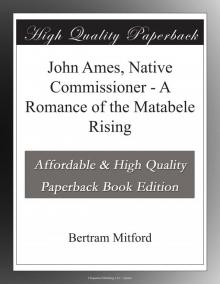 John Ames, Native Commissioner: A Romance of the Matabele Rising
John Ames, Native Commissioner: A Romance of the Matabele Rising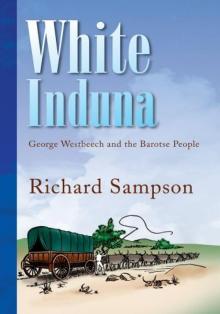 The Induna's Wife
The Induna's Wife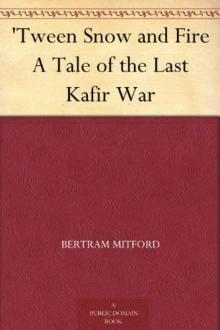 'Tween Snow and Fire: A Tale of the Last Kafir War
'Tween Snow and Fire: A Tale of the Last Kafir War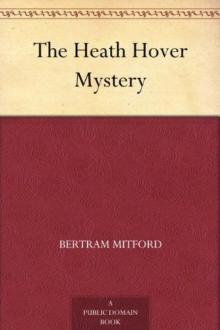 The Heath Hover Mystery
The Heath Hover Mystery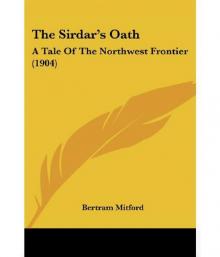 The Sirdar's Oath: A Tale of the North-West Frontier
The Sirdar's Oath: A Tale of the North-West Frontier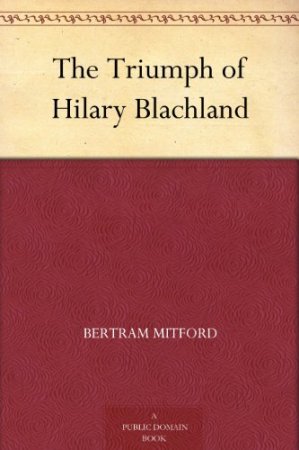 The Triumph of Hilary Blachland
The Triumph of Hilary Blachland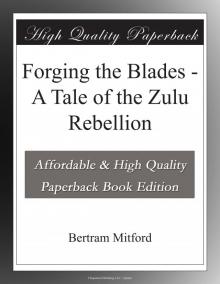 Forging the Blades: A Tale of the Zulu Rebellion
Forging the Blades: A Tale of the Zulu Rebellion The Red Derelict
The Red Derelict The Ruby Sword: A Romance of Baluchistan
The Ruby Sword: A Romance of Baluchistan The Fire Trumpet: A Romance of the Cape Frontier
The Fire Trumpet: A Romance of the Cape Frontier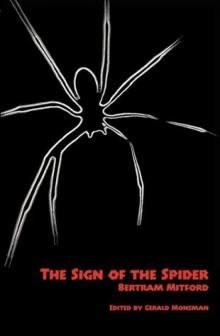 The Sign of the Spider
The Sign of the Spider